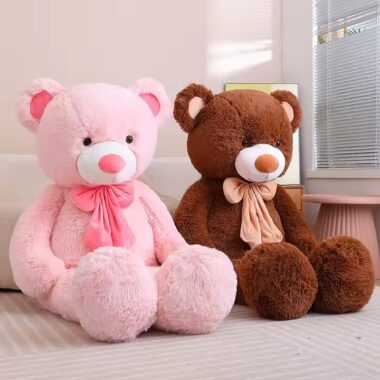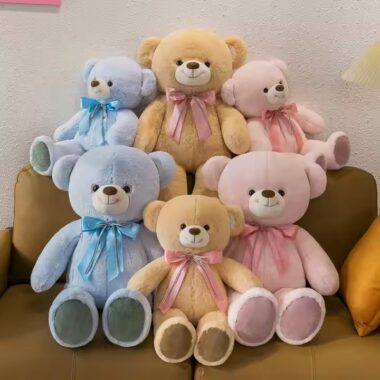Introduction
Stuffed animals have evolved from simple children’s toys into powerful branding tools. Today, companies use plush mascots for retail, promotional giveaways, and even corporate identity projects. A well-designed custom stuffed animal not only captures attention but also builds emotional connections with customers. If you are planning to bring your ideas to life, understanding the customization process will help you communicate effectively with a factory or supplier and achieve the results you expect.
✏️ 1. Define Your Brand Vision
Every successful project starts with a clear vision. Think carefully about the purpose of your stuffed animals. Do you want them to serve as promotional giveaways, as retail products with your logo, or as mascots for events? A stuffed animal factory can transform a hand-drawn sketch into a tangible prototype, but only if the creative direction is clear. Defining the vision upfront also helps control cost and ensures that the final product is aligned with your brand’s identity.
🎨 2. Select Fabrics and Fillings
Material selection is one of the most important decisions in customizing stuffed animals. Soft plush fabrics with smooth textures are the most popular choice for retail toys, while short-pile fabrics are often used for promotional items. Fillings vary from polyester cotton to recycled fibers, depending on your budget and sustainability goals. If your brand emphasizes eco-friendly values, choosing organic or recycled fillings will strengthen your message. A custom plush supplier will often present multiple fabric swatches so you can compare touch, weight, and appearance before committing.
🪡 3. Add Branding Elements
Branding transforms a standard stuffed animal into a unique brand asset. Embroidered logos, woven labels, and custom tags are common solutions. For example, adding a small shirt, scarf, or accessory with your brand’s logo increases visibility and creates a lasting impression. Corporate buyers often request mascots wearing custom uniforms or branded clothing to reflect their company identity. By discussing these branding elements early with the factory, you can ensure that design, placement, and durability all meet your expectations.
📏 4. Decide on Size and Shape
Size matters not only for design but also for pricing and shipping. Smaller plush keychains or 10–15 cm toys are cost-effective for giveaways and bulk promotions, while larger teddy bears and mascots (50 cm or more) work better for retail or brand showcases. Shape customization also plays a big role. Factories can create animals, fruits, characters, or completely unique mascots that match your concept. The more precise your design, the easier it will be for the factory to create a sample that meets your expectations.
📦 5. Packaging That Represents Your Brand
Packaging is an often-overlooked aspect of customization. Beyond protecting the product, packaging communicates your brand value. Options include polybags for simple wholesale supply, custom-printed boxes for retail shelves, or eco-friendly cartons for sustainable brands. Gift packaging with ribbons or windows can enhance the perceived value of the toy. Discuss with your supplier whether packaging costs are included in the quotation or charged separately, as this will affect your overall pricing strategy.
💰 6. MOQ and Pricing Considerations
Minimum Order Quantity (MOQ) is one of the first questions buyers ask. For stuffed animals, MOQs vary depending on size, complexity, and customization level. A simple plush keychain may start at 300–500 pieces, while detailed mascots may require 1,000 or more. Pricing is influenced by fabric type, embroidery, stuffing, packaging, and compliance requirements. As a buyer, you should request a clear breakdown from the factory to understand how each factor affects cost. This helps avoid hidden expenses and allows you to plan your budget with confidence.
🌍 7. Quality Standards and Certifications
International buyers often require products that comply with safety standards such as EN71 (Europe), ASTM (USA), or CPSIA (children’s products). A professional stuffed animal factory will provide test reports and certifications to prove compliance. Quality checks include seam strength, embroidery accuracy, stuffing consistency, and fabric durability. Having documented quality control processes not only ensures customer safety but also reduces the risk of returns or complaints in wholesale markets.
🚚 8. Sampling and Lead Times
The customization process usually begins with a sample. Factories typically take 7–14 days to create a prototype, depending on complexity. During this stage, you can review photos or request the physical sample to check details. Adjustments can be made to embroidery, shape, or materials. Once approved, mass production starts. Bulk orders usually require 30–45 days, with shipping adding another 20–30 days depending on the method (sea freight vs. air freight). Planning ahead ensures your products arrive on time for seasonal promotions or retail launches.
🤝 9. Choosing the Right Partner
The success of your project depends largely on the factory or supplier you choose. A reliable partner offers not only production but also design advice, packaging support, and international logistics experience. Look for a supplier that has worked with global clients, provides flexible MOQs, and demonstrates strong communication. A long-term relationship with a trusted manufacturer saves you time, reduces risks, and allows your brand to scale smoothly.
Conclusion
Customizing stuffed animals is both a creative and strategic process. From defining brand vision and choosing fabrics to adding logos, packaging, and ensuring compliance, each step plays a role in building a successful product. By collaborating with a professional stuffed animal factory or custom plush supplier, you can transform simple ideas into powerful brand assets that engage customers worldwide. With careful planning and the right partner, your stuffed animals can become more than toys—they can become ambassadors of your brand.











